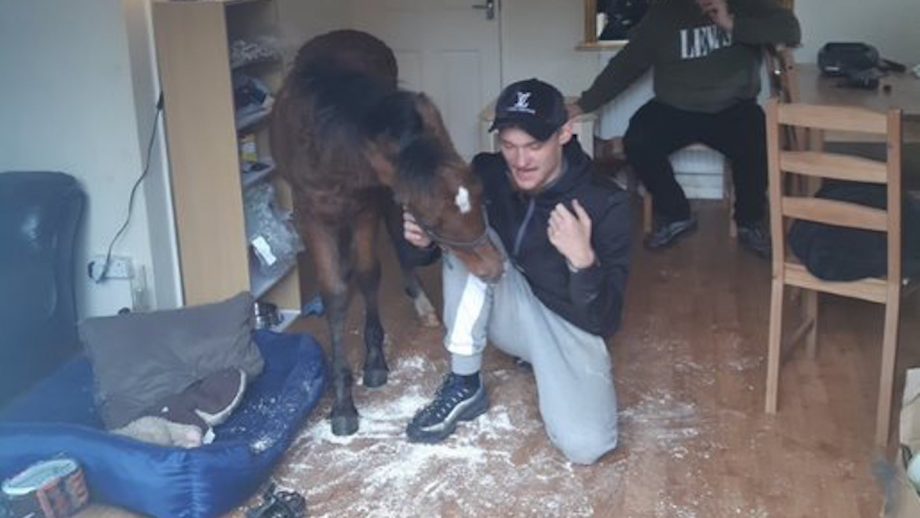Two connected studies looked into the unique relationship between horses and humans, and how this affects decisions from purchase through to euthanasia. H&H speaks to the researchers to find out more
THE unique nature of the human-horse relationship, from financial purchase to family member to euthanasia, has been explored in research that it is hoped will help all parties in future.
A qualitative study on the influence of the human-horse bond on key events in equine lifetimes, and the follow-up cross-sectional research on buying and euthanasia decision-making, both funded by the Horse Trust, has been published in Vet Record.
{"content":"PHA+UHJpbmNpcGFsIGF1dGhvciBTYXJhaCBGcmVlbWFuLCBhIHByb2Zlc3NvciBpbiB2ZXRlcmluYXJ5IHN1cmdlcnkgYXQgdGhlIFVuaXZlcnNpdHkgb2YgTm90dGluZ2hhbSwgdG9sZCA8ZW0+SCZhbXA7SDwvZW0+IHRoZSBpbml0aWFsIHN0dWR5IGNvbXByaXNlZCBpbi1kZXB0aCBpbnRlcnZpZXdzIHdpdGggb3duZXJzLiBUaGlzIHJhaXNlZCBpc3N1ZXMgdGhhdCB3ZXJlIHRoZW4gdGFrZW4gZnVydGhlciwgdG8gdGhlIHdpZGVyIGVxdWVzdHJpYW4gcG9wdWxhdGlvbi48L3A+CjxwPlByb2YgRnJlZW1hbiBzYWlkIG9uZSBmaW5kaW5nIG9mIGludGVyZXN0IHdhcyB0aGF0IHJpZGVycyB3ZXJlIGdvb2QgYXQgYXNraW5nIGZvciBhZHZpY2UgaW4gc29tZSBhcmVhcyBidXQgbGVzcyBzbyBpbiBvdGhlcnMsIHN1Y2ggYXMgd2hldGhlciBhIGhvcnNlIHRoZXkgd2VyZSBjb25zaWRlcmluZyBidXlpbmcgd2FzIHJpZ2h0IGZvciB0aGVtLCBhbmQgdGhlIHJpZ2h0IHByaWNlLjwvcD4KPHA+4oCcVGhhdOKAmXMgZGVmaW5pdGVseSB0aG91Z2h0IHRvIGJlIGFuIGFyZWEgd2UgY2FuIGVuY291cmFnZSBwZW9wbGUgdG8gaGF2ZSBjb252ZXJzYXRpb25zIGluLOKAnSBzaGUgc2FpZC4g4oCcTWFueSBwZW9wbGUgd2lsbCBhc2sgdGhlIHZldCBpZiBpdOKAmXMgaGVhbHRoeSwgYnV0IG5vdCB3aGV0aGVyIGl04oCZcyB0aGUgcmlnaHQgaG9yc2UsIGF0IHRoZSByaWdodCBwcmljZS4gSWYgaXTigJlzIG5vdCwgdGhhdCBjYW4gYmUgYSB2ZXJ5IGRpZmZpY3VsdCBzaXR1YXRpb24gdG8gZXh0cmFjdCB5b3Vyc2VsZiBmcm9tLuKAnTwvcD4KPHA+PGRpdiBjbGFzcz0iYWQtY29udGFpbmVyIGFkLWNvbnRhaW5lci0tbW9iaWxlIj48ZGl2IGlkPSJwb3N0LWlubGluZS0yIiBjbGFzcz0iaXBjLWFkdmVydCI+PC9kaXY+PC9kaXY+PHNlY3Rpb24gaWQ9ImVtYmVkX2NvZGUtMzEiIGNsYXNzPSJoaWRkZW4tbWQgaGlkZGVuLWxnIHMtY29udGFpbmVyIHN0aWNreS1hbmNob3IgaGlkZS13aWRnZXQtdGl0bGUgd2lkZ2V0X2VtYmVkX2NvZGUgcHJlbWl1bV9pbmxpbmVfMiI+PHNlY3Rpb24gY2xhc3M9InMtY29udGFpbmVyIGxpc3RpbmctLXNpbmdsZSBsaXN0aW5nLS1zaW5nbGUtc2hhcmV0aHJvdWdoIGltYWdlLWFzcGVjdC1sYW5kc2NhcGUgZGVmYXVsdCBzaGFyZXRocm91Z2gtYWQgc2hhcmV0aHJvdWdoLWFkLWhpZGRlbiI+DQogIDxkaXYgY2xhc3M9InMtY29udGFpbmVyX19pbm5lciI+DQogICAgPHVsPg0KICAgICAgPGxpIGlkPSJuYXRpdmUtY29udGVudC1tb2JpbGUiIGNsYXNzPSJsaXN0aW5nLWl0ZW0iPg0KICAgICAgPC9saT4NCiAgICA8L3VsPg0KICA8L2Rpdj4NCjwvc2VjdGlvbj48L3NlY3Rpb24+PC9wPgo8cD5Qcm9mIEZyZWVtYW4gc2FpZCB0aGUgcmVzZWFyY2ggZm91bmQgdGhhdCBtYW55IGxlc3MgZXhwZXJpZW5jZWQgb3duZXJzIGhhZCDigJxhIHJlYWwgc2hvY2vigJ0gd2hlbiB0aGV5IGZvdW5kIG91dCA8YSBocmVmPSJodHRwczovL3d3dy5ob3JzZWFuZGhvdW5kLmNvLnVrL2ZlYXR1cmVzL2hvdy1tdWNoLWRvZXMtYS1ob3JzZS1jb3N0LWEtbW9udGgtMjk3NTE3Ij5ob3cgbXVjaCBrZWVwaW5nIGEgaG9yc2UgY29zdHM8L2E+LCBpbiBtb25leSBhbmQgdGltZS48L3A+CjxwPuKAnFdoZW4geW91IHN0YXJ0IGFza2luZyBwZW9wbGUgdG8gYWRkIHVwIGV2ZXJ5dGhpbmcsIGl04oCZcyBjbGVhciBpdOKAmXMgYSBtYWpvciwgbWFqb3IgY29tbWl0bWVudCzigJ0gc2hlIHNhaWQuIOKAnFRoZSBhdmVyYWdlIGFubnVhbCBjb3N0IHdhcyDCozksMjE1LCBidXQgaXQgd2VudCB1cCB0byDCozE0LDAwMCwgYW5kIHRoZXJlIHdhcyBhIHBlcmNlcHRpb24gb2Ygc29jaWFsIHByZXNzdXJlIHRvIGJ1eSBldmVyeXRoaW5nIGFuZCBkbyBldmVyeXRoaW5nLiBJZiB5b3XigJlyZSBtb3JlIGV4cGVyaWVuY2VkLCB5b3UgbWlnaHQga25vdyB5b3UgZG9u4oCZdCBuZWVkIHRoaXMgb3IgdGhhdCwgYnV0IGl0IGNhbiBiZSByZWFsbHkgaGFyZCB3aGVuIHlvdeKAmXJlIHRyeWluZyB0byBiZSBhIOKAmGdvb2Qgb3duZXLigJksIGFuZCBldmVyeW9uZeKAmXMgcHVzaGluZyBhbmQgbWFya2V0aW5nLuKAnTwvcD4KPHA+UHJvZiBGcmVlbWFuIHNhaWQgdGhlIHRlYW0gd2FzIGF3YXJlIGluIGFkdmFuY2UgYWJvdXQgaG93IGRpZmZpY3VsdCBpdCBpcyB0byBtYWtlIGRlY2lzaW9ucyBhYm91dCBldXRoYW5hc2lhLCBidXQgc29tZXRoaW5nIHRoYXQgY2FtZSBvdXQgb2YgdGhlIHN0dWR5IHdhcyDigJxyZXNwb25zaWJpbGl0eSBncmllZuKAnSwgd2hlbiBwZW9wbGUgZmVlbCBndWlsdHkgZm9yIDxhIGhyZWY9Imh0dHBzOi8vd3d3LmhvcnNlYW5kaG91bmQuY28udWsvcGx1cy92ZXQtbGlicmFyeS9lcXVpbmUtZXV0aGFuYXNpYS1ob3JzZS1wdXQtZG93bi03MTgzMDUiPnB1dHRpbmcgYSBob3JzZSBkb3duPC9hPi48L3A+CjxkaXYgY2xhc3M9ImFkLWNvbnRhaW5lciBhZC1jb250YWluZXItLW1vYmlsZSI+PGRpdiBpZD0icG9zdC1pbmxpbmUtMyIgY2xhc3M9ImlwYy1hZHZlcnQiPjwvZGl2PjwvZGl2Pgo8cD7igJxTb21lIHBlb3BsZSBzYWlkIHRoZXkgZmVsdCB0aGV54oCZZCBtdXJkZXJlZCB0aGVpciBob3JzZXMsIGJlY2F1c2UgdGhleSBtYWRlIHRoYXQgZGVjaXNpb24s4oCdIHNoZSBzYWlkLiDigJxUaGUgaG9yc2UtaHVtYW4gcmVsYXRpb25zaGlwIGlzIGEgc3RyYW5nZSBvbmUgYmVjYXVzZSB5b3UgYnV5IGEgaG9yc2UgYW5kIGl04oCZcyBhIGZpbmFuY2lhbCBkZWNpc2lvbiwgaXQgYmVjb21lcyBsaWtlIGEgZmFtaWx5IG1lbWJlciBvciBiZXN0IGZyaWVuZCwgYW5kIHRoZW4geW91IGhhdmUgdG8gbWFrZSB0aGF0IGRlY2lzaW9uIHRvIGV1dGhhbmlzZSBpdDsgbm8gd29uZGVyIGl04oCZcyBzbyB0cmF1bWF0aWMgZm9yIHBlb3BsZS4gV2Ugc3Bva2UgdG8gYW1hdGV1cnMgYW5kIHByb2Zlc3Npb25hbHMsIGFuZCB0aG91Z2h0IGZvciBhIHBybyB3aXRoIGEgc3RyaW5nIG9mIGhvcnNlcyBpdCBtaWdodCBiZSBkaWZmZXJlbnQsIGJ1dCBpdCB3YXNu4oCZdDsgdGhlIGd1aWx0IGFuZCBncmllZiB3YXMganVzdCB0aGUgc2FtZS7igJ08L3A+CjxwPlByb2YgRnJlZW1hbiBzYWlkIHRoZSByZXNlYXJjaGVycyB3ZXJlIGNvbmNlcm5lZCBhYm91dCBsb25nLWxhc3RpbmcgZ3VpbHQsIGVzcGVjaWFsbHkgd2hlbiB0aGlzIGFmZmVjdGVkIGZ1dHVyZSBob3JzZS1idXlpbmcuIFRoZSB0ZWFtIGlzIG5vdyBsb29raW5nIGF0IHNoYXJlZCBkZWNpc2lvbi1tYWtpbmcgbW9kZWxzLCB3aGVyZSBhbGwgdGhlIHRlYW0gaW52b2x2ZWQgd2l0aCBhbnkgaG9yc2UgY2FuIGhhdmUgYSBncm91cCBkaXNjdXNzaW9uIGFib3V0IGl0cyBiZXN0IGludGVyZXN0cywgc28gdGhlIG93bmVyIGRvZXMgbm90IGZlZWwgdGhleSBoYXZlIG1hZGUgdGhlIGRlY2lzaW9uIGFsb25lLiBUaGUgd29yayBpcyBhbHNvIHRha2luZyBpbiBxdWFsaXR5IG9mIGxpZmUsIHRvIGludmVzdGlnYXRlIHdoZXRoZXIgZW5kLW9mLWxpZmUgZGVjaXNpb25zIGFyZSBiZWluZyBtYWRlIGF0IHRoZSByaWdodCB0aW1lLjwvcD4KPGRpdiBjbGFzcz0iYWQtY29udGFpbmVyIGFkLWNvbnRhaW5lci0tbW9iaWxlIj48ZGl2IGlkPSJwb3N0LWlubGluZS00IiBjbGFzcz0iaXBjLWFkdmVydCI+PC9kaXY+PC9kaXY+CjxwPuKAnEnigJltIHJlYWxseSBnbGFkIHRoZXJl4oCZcyBtb3JlIHJlc2VhcmNoIGludG8gdGhlc2UgYXJlYXMs4oCdIHNoZSBzYWlkLiDigJxJIHRoaW5rIGhvdyB0aGUgaG9yc2UtaHVtYW4gcmVsYXRpb25zaGlwIGFmZmVjdHMgb3VyIGRlY2lzaW9ucyBpcyByZWFsbHkgaW1wb3J0YW50LuKAnTwvcD4KPHA+UmVzZWFyY2hlciBIYXJyaWV0IENsb3VnaCB0b2xkIDxlbT5IJmFtcDtIPC9lbT4gc2hlIHdhcyBpbnRlcmVzdGVkIHRvIGZpbmQgb3V0IGhvdyBtYW55IHJlc3BvbmRlbnRzIGtlcHQgb3IgcGxhbm5lZCB0byBrZWVwIHRoZWlyIGhvcnNlcyBmb3IgbGlmZS48L3A+CjxkaXYgY2xhc3M9ImFkLWNvbnRhaW5lciBhZC1jb250YWluZXItLW1vYmlsZSI+PGRpdiBpZD0icG9zdC1pbmxpbmUtNSIgY2xhc3M9ImlwYy1hZHZlcnQiPjwvZGl2PjwvZGl2Pgo8cD7igJxTbyBJIHdhcyBzdXJwcmlzZWQgYnkgaG93IG1hbnkgcGVvcGxlIGRpZG7igJl0IHJlYWxseSBzZWVrIGFkdmljZSB3aGVuIGJ1eWluZyBob3JzZXMs4oCdIHNoZSBzYWlkLiDigJxUaGV5IGtlcHQgaXQgdG8gdGhlbXNlbHZlcywgd2hpY2ggaXMgbWF5YmUgYSByZWZsZWN0aW9uIG9mIGhvdyBwZXJzb25hbCBhIHRoaW5nIGl0IGlzOyBpdOKAmXMgYSBsaWZlc3R5bGUgcmF0aGVyIHRoYW4gYSBob2JieS4gTWFueSBwZW9wbGUgd2hvIGhhZCBsb3N0IHRoZWlyIGhvcnNlcyBtaXNzZWQgdGhhdCBsaWZlc3R5bGUsIGFzIHdlbGwgYXMgdGhlIGhvcnNlcyB0aGVtc2VsdmVzLuKAnTwvcD4KPHA+TXMgQ2xvdWdoIGJlbGlldmVzIHRoZSBzaGFyZWQgZGVjaXNpb24tbWFraW5nIG1vZGVsIHdpbGwgYmUgaGVscGZ1bCwgYWRkaW5nIHRoYXQgc29tZSByZXNwb25kZW50cyBzYWlkIHRoZXkgZmVsdCBqdWRnZWQgZm9yIHB1dHRpbmcgaG9yc2VzIGRvd24uPC9wPgo8cD7igJxUaGVyZSBhcmUgbG90cyBvZiB0aGluZ3Mgd2UgY2FuIGRvIHdpdGggdGhpcyByZXNlYXJjaCwgd2hpY2ggaXMgcmVhbGx5IGV4Y2l0aW5nLCBhbmQgaXTigJlzIGdvb2QgdG8gZ2V0IGl0IG91dCB0aGVyZSzigJ0gc2hlIHNhaWQuPC9wPgo8cD7igJxJ4oCZZCBsb3ZlIHRvIHNlZSBwZW9wbGUgdGFsa2luZyBtb3JlIGFib3V0IGl0OyBhYm91dCBob3cgbXVjaCBpdCBjb3N0cyB0byBrZWVwIGhvcnNlcywgYW5kIHRoZSBkZWNpc2lvbnMgdGhleSBoYXZlIHRvIG1ha2UsIHdpdGhvdXQgZmVlbGluZyBqdWRnZWQuIFRoZXNlIGRlY2lzaW9ucyBhcmUgcGFydCBhbmQgcGFyY2VsIG9mIG93bmluZyBhIGhvcnNlIGFuZCB3ZSBzaG91bGQgYmUgYWJsZSB0byB0YWxrIGFib3V0IHRoZW0u4oCdPC9wPgo8cD5Ib3JzZSBUcnVzdCBoZWFkIG9mIHJlc2VhcmNoIGFuZCBwb2xpY3kgSmFuIFJvZ2VycyB0b2xkIDxlbT5IJmFtcDtIPC9lbT4gdGhlIGNoYXJpdHkgZnVuZHMgcmVzZWFyY2ggdGhhdCBpcyDigJxkaXJlY3RseSBhcHBsaWNhYmxlIHRvIHRoZSB3ZWxsYmVpbmcgb2Ygb3VyIG93biBhbmQsIGluIGZhY3QsIGFsbCBob3JzZXPigJ0sIGFuZCB0aGF0IGl0IGFzc2Vzc2VzIGluZHVzdHJ5IHByaW9yaXRpZXMgYXMgd2VsbCBhcyBzY2llbnRpZmljIHJpZ291ciBpbiBjaG9vc2luZyB0aGUgcHJvamVjdHMgaXQgZnVuZHMuPC9wPgo8cD7igJxIYXJyaWV0IENsb3VnaOKAmXMgd29yayBpZGVudGlmaWVkIHNvbWUgaW1wb3J0YW50IGRlY2lzaW9uLW1ha2luZyBwb2ludHMgaW4gaG9yc2Ugb3duZXJzaGlwLCBwdXJjaGFzZSBhbmQgZXV0aGFuYXNpYSwgYm90aCBvZiB3aGljaCBhcmUgcGl2b3RhbCBmb3IgaG9yc2Ugd2VsbGJlaW5nLOKAnSBzaGUgc2FpZC48L3A+CjxwPuKAnFRoYXQgb3ZlciA4MCUgcGxhbm5lZCB0byBrZWVwIHRoZSBob3JzZSB0aGV5IGJvdWdodCBmb3IgbGlmZSBtYWtlcyBpdCBzdXJwcmlzaW5nIHRoYXQgMzglIGRpZG7igJl0IHNlZWsgYWR2aWNlIGJlZm9yZSB0aGV5IGJvdWdodCB0aGF0IGxpZmV0aW1lIGZyaWVuZC4gSG93IGNhbiB3ZSBtYWtlIGl0IGVhc2llciBmb3IgcGVvcGxlIHRvIGFjY2VzcyB0aGUgYWR2aWNlIHRoYXQgdGhleSBtYXkgdWx0aW1hdGVseSBmaW5kIGNvdWxkIGhhdmUgaGVscGVkPzwvcD4KPGRpdiBjbGFzcz0iaW5qZWN0aW9uIj48L2Rpdj4KPHA+4oCcVGhpcyBldXRoYW5hc2lhIHByb2plY3QgaXMgaW1wb3J0YW50IGJlY2F1c2UgaXQgc3VwcG9ydHMgYSBwcmV2aW91cyBzdHVkeSwgSG9yc2VzIGluIG91ciBIYW5kcywgcHVibGlzaGVkIGluIDIwMTYgYnkgU3VlIEhvcnNlbWFuIGF0IHRoZSBVbml2ZXJzaXR5IG9mIEJyaXN0b2wgYW5kIGZ1bmRlZCBieSBXb3JsZCBIb3JzZSBXZWxmYXJlLiBUaGlzIGlkZW50aWZpZWQgZGVsYXkgaW4gZXV0aGFuYXNpYSBhcyBhIHRvcCB3ZWxmYXJlIGNvbmNlcm4uIFVuZGVyc3RhbmRpbmcgdGhlIGhvcnNlLWh1bWFuIHJlbGF0aW9uc2hpcCBhbmQgaG93IHZldHMgY2FuIHdvcmsgd2l0aCBvd25lcnMgdG8gc3VwcG9ydCB0aW1lbHkgZGVjaXNpb24tbWFraW5nIGluIHRoZSBpbnRlcmVzdHMgb2YgaG9yc2Ugd2VsbGJlaW5nIGF0IGVuZCBvZiBsaWZlIGlzIG9uZSBvZiB0aGUgcmVjb21tZW5kYXRpb25zIG9mIHRoaXMgc3R1ZHkuPC9wPgo8cD7igJxUaGlzIHBpZWNlIG9mIHJlc2VhcmNoIGlzIG5vdyB1bmRlciB3YXkgd2l0aCBtYW55IG9mIHRoZSBzYW1lIHJlc2VhcmNoZXJzIGFzIGEgbG9naWNhbCBuZXh0IHN0ZXAgdG8gaGVscCBvd25lcnMgbWFrZSBnb29kIGRlY2lzaW9ucyBhdCB0aGlzIGRpZmZpY3VsdCB0aW1lLuKAnTwvcD4KPHA+Cg=="}
You might also be interested in…
Library image.
Credit: Alamy Stock Photo
“In all this, I ask please do not send your old horse to face an uncertain future”
Credit: Bill Selwyn
Go Racing Green founder Debbie Matthews told her story at the World Horse Welfare conference 2020. H&H heard why she
Library image
“None of these shortcomings are made up for by our horses’ having expensive tack or being immaculately turned out”
Credit: Alamy Stock Photo
A panel of experts discussed the benefits to horses in their partnership with humans. H&H brings you their thoughts on
“The new owners had bought Humphrey unseen and admitted they didn’t realise what looking after a horse fully entailed”
Stay in touch with all the news in the run-up to and throughout the major shows and events during 2025 and beyond with a Horse & Hound subscription. Subscribe today for all you need to know ahead of these major events, plus online reports on the action as it happens from our expert team of reporters and in-depth analysis in our special commemorative magazines. Have a subscription already? Set up your unlimited website access now
H&H news editor
Eleanor is an experienced journalist who spent over eight years working for local and national newspapers before joining H&H as news editor in March 2016. Passionate about equine welfare and exposing the truth, Eleanor has reported on all aspects of the industry, from Brexit to anti-bullying campaigns, and from dressage rules to mules. Her sport of choice is showjumping, in which she competes her own horses, and she also enjoys reporting at local jumping shows through to international championships.






